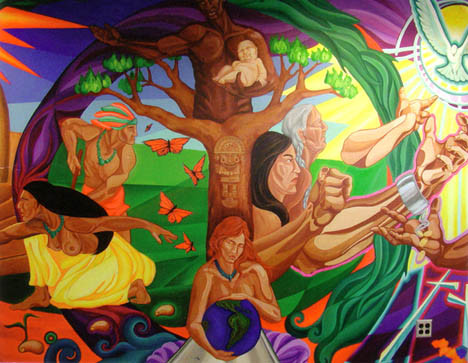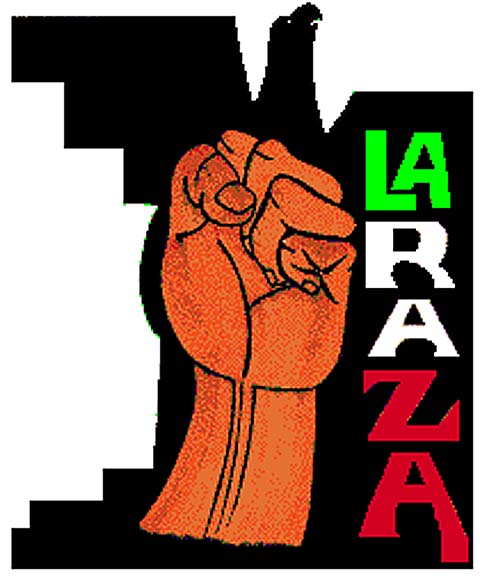Xican@
Politics and culture that reflect the movement for self-determination and civil rights of peoples with roots from Aztlan to Mexico, from the agricultural fields to the urban centers of major cities.
Subcollections
-
Arts, literature and poetry – a program series produced by Comunicacion Aztlan
This collection is comprised of oral history, poetry, dramatic readings, and music. Topics of focus include United Farmworkers, Central and South America, the 1973 coup in Chile, Wounded Knee, Bay Area community issues and Chican@/Latin@ culture. -
Political issues of the time – a program series produced by Comunicacion Aztlan
This collection derives from radio programming at KPFA during the early 1970s. Major topics of focus are the 1973 coup in Chile and the Chicano student movement and the Crusade for Justice. -
Reflecciones de la Raza by Comunicacion Aztlan
Broadcast from November 1971- November 1974, “Reflecciones de la Raza,” one of Northern California's first bilingual community radio programs. The program included call-ins, music, interviews, poetry, events, and coverage of current issues.
Documents
Date: 7/1/1972Call Number: CAA 002Format: 1/4 7 1/2 ipsProducers: Yolanda de FreitasCollection: Arts, literature and poetry – a program series produced by Comunicacion Aztlan
The poetry of the Third World Poet Avotcja Jiltonibro who is originally from Harlem, New York. Her poems include Light My Fire, Hallelujah All, Soulful Sisters, Moonlight in Memphis, Soulful to Uncle Tom & Family, Granmama Funk, Land of the Living Dead, A Little More for Malcolm X, Once Maybe Yesterday, Blind Man, and We the People of Harlem.
Date: 3/29/1973Call Number: CAA 026Format: 1/4 7 1/2 ipsCollection: Arts, literature and poetry – a program series produced by Comunicacion Aztlan
A group discussion from the Festival de Sexto Sol. A group of women, and a couple men, speaking about the importance of women expressing their voices through poetry and documenting them to use as inspiration for future female poets and writers.
Same as CD 289
Call Number: CAA 030Format: 1/4 7 1/2 ipsCollection: Arts, literature and poetry – a program series produced by Comunicacion Aztlan
Music from an unknown female artist, all songs are sung in Spanish.
Date: 3/30/1973Call Number: CAA 032Format: 1/4 7 1/2 ipsProducers: Comunicacion AztlanCollection: Arts, literature and poetry – a program series produced by Comunicacion Aztlan
Poets, academics and students discuss the role of women in Chicano/Latino and Latin American literature. Panelists include: Dorinda Moreno, Antonia Casteneda, Roberto Vargas, andTomas Ybarra-Fausto. Themes include: Women’s presence as subject matter but not as published and known writers; If women realize themselves will the family disintegrate?; The legacy of sexism in 19th & 20 century Mexican literature;the need for positive images of women; the movement as one movement and the need for men to support women’s efforts.
Same as CD 374.
Date: 3/1/1973Call Number: CAA 045Format: 1/4 7 1/2 ipsProducers: Comunicacion AztlanCollection: Arts, literature and poetry – a program series produced by Comunicacion Aztlan
Interview with and poems by Dorinda Moreno.
Same as CD 372.
Date: 12/2/1972Call Number: RP 048Format: 1/4 7 1/2 ipsProducers: Bernice Ramirez, Emiliano Echeverria, Raul TorresCollection: Reflecciones de la Raza by Comunicacion Aztlan
Bernice Ramirez interviewed “Eileen” (pseudonym) about issues pertaining to women in Mexico and the difficulties they face
Date: 2/17/1973Call Number: RP 058Format: 1/4 7 1/2 ipsProducers: Nina Serrano, Lillian del Sol, Emiliano EcheverriaCollection: Reflecciones de la Raza by Comunicacion Aztlan
Interviews and poetry about and by women. Themes include music, Puerto Rico, Lolita Lebron, child care, education, work opportunities, and abortion.
La Raza Unida national convention: first time La Raza Unida as a political party has met on a national level, and women met to discuss their roles. Evelina Alarcon speaks about the role of women.
Maria Elena Gaitan breaks down stereotypes of the "docile" Latina. She speaks of the responsibility of educating, role of women in el movimiento, immigrants, CASA, and sexual exploitation. She explains that they are not trying to build a separatist movement. Political and economic crisis in Mexico creates problems for Mexican migrants that come to the United States; mujeres deal with the INS under stressful conditions and are often sexually and physically abused. She speaks specifically of the Sisters from Texas Raza Unida Party. Some women wanted a Caucus, and others felt there was no need for it. "It is up to us to educate each other. With out further communication there will only be further division. Out of 16 States, 10 are represented. The fact that we sat down (as women) was important, so we could relate to each other."
 Machismo in La Raza
Machismo in La Raza
Format: mp3Collection: Xican@
Evelina Alarcon speaks about how machismo functions in La Raza and how society perpetuates machismo. Taken from CD 826.




